|
|
|
Sort Order |
|
|
|
Items / Page
|
|
|
|
|
|
|
| Srl | Item |
| 1 |
ID:
090885
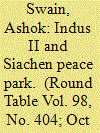

|
|
|
|
|
| Publication |
2009.
|
| Summary/Abstract |
The peace process between India and Pakistan, which started in 2000, moved very slowly before coming to a standstill following the terror attack on Mumbai in November 2008. This article argues that both these two South Asian neighbours need to focus on new areas of bilateral cooperation, which might help them to build mutual trust and provide much-needed impetus to bring peace in the region. The Indus River Agreement of 1960 between India and Pakistan, with its only focus on water sharing, has not been able to generate positive spin-off effects. If both the countries agree to renegotiate the Indus Agreement into an integrated river basin management mechanism, the benefit-sharing might have other peace-enhancing effects and can contribute to bilateral cooperation in other areas. Besides renegotiating the Indus Treaty, both India and Pakistan may also opt for another resource-based conflict management strategy in their tense border areas. For a quarter of a century, both these countries have been involved in an armed conflict to gain control of the Siachen glacier. If they decide to covert this disputed area as a Peace Park, it may provide an excellent exit strategy for both the armed forces-and the local people will support this move as it will give a boost to eco-tourism in the area. India and Pakistan, by establishing a Peace Park in Siachen and forming a basin-based river management institution on the Indus River, can reduce their trust deficit, which will help them to address their other long-standing bilateral contentious issues.
|
|
|
|
|
|
|
|
|
|
|
|
|
|
|
|
| 2 |
ID:
068622
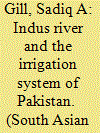

|
|
|
| 3 |
ID:
043641
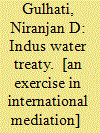

|
|
|
|
|
| Publication |
Bombay, Allied Publishers, 1973.
|
| Description |
xix, 472p.
|
| Contents |
B
|
|
|
|
|
|
|
|
|
|
|
|
Copies: C:1/I:0,R:0,Q:0
Circulation
| Accession# | Call# | Current Location | Status | Policy | Location |
| 011911 | 341.442/GUL 011911 | Main | On Shelf | General | |
|
|
|
|
| 4 |
ID:
066544


|
|
|
|
|
| Publication |
Lahore, Bright Books, 2005.
|
| Description |
323p.
|
| Standard Number |
9698780114
|
|
|
|
|
|
|
|
|
|
|
|
Copies: C:1/I:0,R:0,Q:0
Circulation
| Accession# | Call# | Current Location | Status | Policy | Location |
| 050334 | 341.4420266540549/MAL 050334 | Main | On Shelf | General | |
|
|
|
|
| 5 |
ID:
088930


|
|
|
|
|
| Summary/Abstract |
Third parties have been active in assisting adversarial states to navigate their international river disputes. By using the carrot and stick to facilitate compromise, mediators have also participated in the negotiations leading to the signing of treaties over international rivers. Yet, due to the nature of the issue confronting riparian states, the long-term impact of these efforts is likely to be unstable cooperation rather than cooperation. This is still an important contribution, because the absence of mediation efforts may contribute to an environment of conflict. However, since riparian states confront a relationship that involves the need to continuously manage disputes that arise as states develop their international rivers, a mediator may be more effective in facilitating cooperation if it assists developing states with a history of animosity to establish effectively designed river basin commissions and it oversees the implementation of treaties. Participating in the initial years of a treaty's implementation by coordinating the donor community to underwrite projects can minimize the potential disputes riparians confront. An effectively designed river basin commission can assist in facilitating cooperation long after the mediator has departed from the region. To demonstrate this argument, the article draws on the Indus River case, which has lived through four different phases. The Euphrates and Tigris Rivers are used to illustrate the argument's ability to explain other cases.
|
|
|
|
|
|
|
|
|
|
|
|
|
|
|
|
| 6 |
ID:
051363
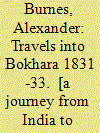

|
|
|
|
|
| Publication |
New Delhi, Asian educational services, 1992.
|
| Description |
3v.(xxii, 356p.; xv, 473p.; xix, 332p.)Hbk
|
| Contents |
3vol. set.
|
| Standard Number |
8120607953
|
|
|
|
|
|
|
|
|
|
|
|
Copies: C:3/I:0,R:0,Q:0
Circulation
| Accession# | Call# | Current Location | Status | Policy | Location |
| 048082 | 915/BUR 048082 | Main | On Shelf | General | |
| 048083 | 915/BUR 048083 | Main | On Shelf | General | |
| 048084 | 915/BUR 048084 | Main | On Shelf | General | |
|
|
|
|
| 7 |
ID:
111201
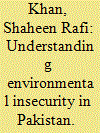

|
|
|
| 8 |
ID:
114009
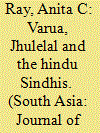

|
|
|
|
|
| Publication |
2012.
|
| Summary/Abstract |
The worship of Varua has persisted among the Hindu Sindhis for more than three and a half millennia. This paper enquires into the reasons for this deity's vitality and longevity, examining his representation in the earliest records of the Hindus and considering critical moments in his career-such as his manifestation as Jhulelal in the eleventh century and the resurgence in his worship after the Partition of India in 1947. The paper proposes that Varua's biography represents a long conversation between faith and cultures and that he has survived within the flow of history because the Hindu Sindhis have creatively preserved his quintessential attributes.
|
|
|
|
|
|
|
|
|
|
|
|
|
|
|
|
|
|
|
|
|